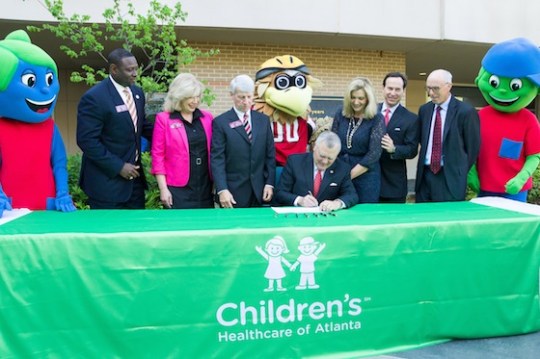Children’s Healthcare of Atlanta treated 1,400 children last year for concussions at its emergency rooms and urgent care centers.
Meanwhile, the Atlanta health system received 5,000 calls to its hotline fielding queries about possible concussions.
Dr. David Marshall, medical director for sports medicine at Children’s Healthcare, told GHN on Tuesday that he does not believe the incidence of concussions has jumped, but that public awareness of them “has exploded.’’
Marshall, CEO Donna Hyland and other Children’s Healthcare officials spoke of the importance of proper concussion treatment at a ceremony Tuesday at the health system’s Scottish Rite campus that featured Gov. Nathan Deal signing the Return to Play Act into law. The measure was passed by the General Assembly during its recently concluded session.
The main provisions of the act include informing parents or guardians of school athletes of the consequences of concussions, and educating coaches and school training staff on how to recognize symptoms.
And under the bill, any player with a concussion must be removed from a game until a health care provider clears the athlete to return.
A concussion that goes untreated can have serious medical effects, Deal told a crowd of health officials, legislators, NFL officials and health advocates at the bill-signing ceremony.
“I am proud to sign this bill that serves to protect Georgia’s young athletes from sustaining very serious injuries if the condition goes unnoticed or untreated,” Deal said.
More than 40 states have passed similar concussion legislation.

The Georgia law also applies to cheerleaders, who are often at risk of head injury but do not wear any protective headgear.
Recreation sports leagues must provide the parents with the information sheet on concussions. The leagues are also encouraged, but not required, to take the other steps.
Marshall of Children’s Healthcare told GHN that the Georgia legislation is “a tremendous first step’’ in educating young athletes, schools, medical personnel and parents about the possible serious medical effects of concussions.
The CDC estimates that up to 3.8 million concussions related to sports or recreation occur every year in the U.S. (Here’s a Children’s Healthcare concussion toolkit about signs, symptoms and treatment.)
Former football players, hockey players and other athletes have reported having serious neurological issues in retirement. Hundreds of former pro football players are suing the NFL over concussion-related health problems.
The NFL, while it denies the claims, has gotten tough against helmet-to-helmet hits by players, as well as instituting a league-wide sideline testing protocol for concussions.
In March, the league passed a rules change that will ban players from delivering forceful blows with the crown of the helmet.
The NFL supported the Georgia legislation, noted Rich McKay, the Atlanta Falcons president, who spoke at the bill ceremony.
Too often in the past, players have suffered concussions but have been put immediately back into games or simply continued playing, experts say. (Here’s a GHN article from last year on this issue.)
During Tuesday’s signing, Deal was joined by a 12-year-old lacrosse player who suffered a concussion when she was hit in the head by a ball during a lacrosse clinic.
“I saw black flashes, like you were in a different world for a couple of minutes,” she told 11Alive News.
Also attending the ceremony was state Rep. Demetrius Douglas (D-Stockbridge), a former UGA linebacker, who told GHN recently that he probably had concussions as an athlete, though he wasn’t aware of it.
The goal of the legislation is to prevent long-term injury, Douglas told GHN.
“Kids want to play the game but don’t understand [the impact] on the brain,’’ he said.
